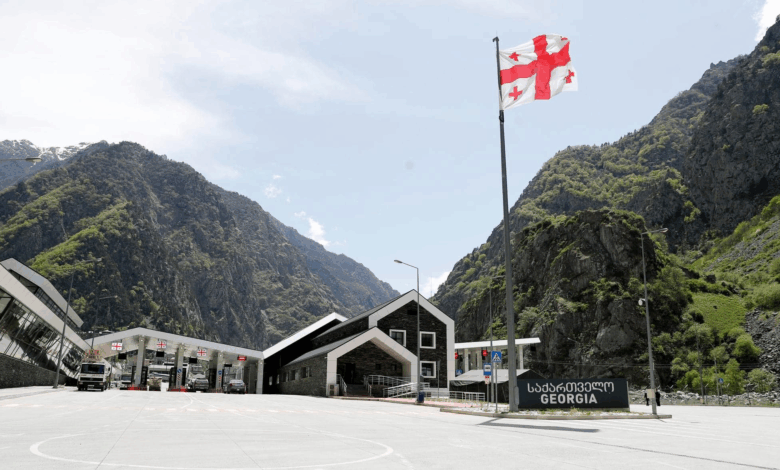
Number of Ukrainians Stranded at Georgia-Russia Border Grows as Tbilisi, Kyiv Say They Seek Solution
Between 80 and 90 Ukrainians are reported to be stranded at the Georgian-Russian transit zone in poor conditions as Tbilisi denies them entry citing their “criminal past”, while Kyiv says it is seeking solution and accuses Russia of “weaponizing deportations.”
Reports of dozens of Ukrainians deported from Russia and stranded in the “neutral zone” between Georgia and Russia, in Dariali gorge, began surfacing weeks ago, with deportees describing dire conditions including being trapped a windowless basement with limited air circulation and with insufficient beds. While deportations date back to 2023, Moscow has reportedly intensified the practice recently, aggravating the crisis.
“Russia is weaponizing the deportation of Ukrainian citizens through Georgia. We propose that Russia transport them directly to the Ukrainian border instead,” Ukrainian Foreign Minister Andrii Sybiha wrote on X on July 19.
According to Sybiha, since June, Moscow “has significantly increased the number of deported Ukrainian nationals, mostly former convicts, to the border with Georgia,” leaving dozens, with many lacking proper documentation, stranded in the transit zone. The foreign minister said Ukrainian consuls were working to provide them with documentation and return them to Ukraine via Moldova, noting that 43 citizens have already been evacuated through this route.
Sybiha said Kyiv was actively working with Georgia and Moldova to arrange transportation, but publicly offered Russia “to send these categories of Ukrainian citizens directly to the Ukrainian border,” saying “there is no guarantee that Russia will not increase the number of deportees even further.”
Tbilisi Denies Entry Citing Criminal Records of Ukrainians
In a July 20 statement, the Georgian Interior Ministry cited the “criminal past” of the stranded Ukrainians behind denying them entry “on the grounds of national security interests,” but noted consultations were underway to return them to their homeland.
According to the Ministry, which didn’t clearly point to the deportation practice, the number of “individuals coming from the Russian Federation, who ask to cross the Georgian state border with invalid documents and state that they are Ukrainian citizens,” and who remain in the border zone, is currently up to 80.
“Most of these individuals have a serious criminal past and have been convicted numerous times for grave or particularly grave crimes,” the Ministry said, citing their certificates of release from penitentiary facilities that deportees presented, as well as the stranded individuals’ own accounts.
Tbilisi argued that it had offered Kyiv to transport the individuals to Ukraine via sea and air routes. The Ministry did not provide more details about the routes but noted that the Ukrainian side has so far abstained from using the sea route, while active consultations were underway on safe transportation, including via air.
On July 10, the BBC reported that the return operations were suspended after Moldova refused the transit following initial successful transportation. Ukrainian human rights defenders told the BBC that the Moldova route involved transporting deportees to Tbilisi airport, flying them to Chișinău, from where they took a bus to Odessa, Ukraine, on their own. The problem reportedly emerged after four deportees didn’t reach Ukraine, and their return documents didn’t allow them to stay in Moldova.
“People who flew to Moldova were put on a bus by police officers, but they traveled further on their own. Some did not [reach Ukraine]. That was the problem,” Anna Skripka, a lawyer from the Defence of Prisoners in Ukraine, a human rights group, told the BBC. The article doesn’t detail the exact reasons why the group of deportees did not reach Ukraine.
Volunteers Raise Alarm Over “Humanitarian Catastrophe”
Volunteers working with Ukrainian deportees criticised the accounts of Georgian authorities who cited the “criminal past” of deportees in denying them entry and claimed that the deportees were held in “normal” conditions.
“There are different categories of citizens at the border in unbearable conditions, including those who have never committed a criminal offence and have no criminal record,” Volunteers of Tbilisi, a Georgia-based initiative, cited its head, Maria Belkina, on July 18.
Belkina earlier told the BBC that deportees consisted of different groups, including those who were jailed in Ukrainian territories and were taken to Russia following the Russian occupation; the Ukrainians who served their jail terms on the Russian territory; and those without criminal records who were residents of Russia-occupied Ukrainian territories but were deported by Moscow after they refused Russian citizenship.
The group wrote on Facebook that there were 90 people in the basement in the border zone with only “about 20 beds.”
“People cannot go outside, they are trapped in an unventilated, windowless room,” the group said, noting that some of them suffer from multiple chronic illnesses, are not provided with water or food, and two of them were hospitalized. “This is a real humanitarian catastrophe and we believe that there is a high risk of violence inside because of the high psychological and moral tension.”
Volunteers of Tbilisi also criticised the narrative of Georgian authorities about arriving Ukrainians asking to cross the border.
The Ukrainians in the border zone “were deported from Russia not of their own free will,” the group said. “Russia is expelling them from its territory, and Georgia is the only land border through which Russia can hand over Ukrainian citizens to Ukraine.”
According to Volunteers of Tbilisi, some people were brought to Upper Larsi border checkpoint “under convoy”, while others were ordered to leave Russia and they had no other way but to go to the checkpoint.
Also Read
- 03/04/2025 – Georgia Reduces Visa-Free Stay for Ukrainians from Three Years to One
- 29/08/2023 – Six Stranded Ukrainians Allowed Entry into Georgia
This post is also available in: ქართული